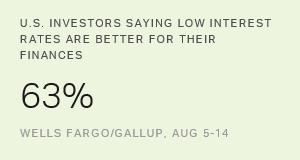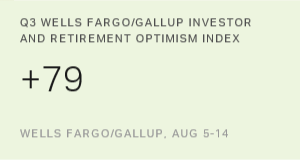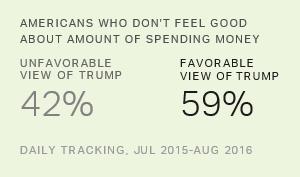Story Highlights
- 63% prefer low interest rates; 33% would rather have high rates
- Continued stock market volatility seen as bigger threat than low rates
- 22% give "a lot of thought" to low interest rates in financial planning
WASHINGTON, D.C. -- U.S. investors overall say low interest rates (63%) are better than high interest rates (33%) when asked which would be better for their financial situation today. However, these views vary widely by working status. Retired investors prefer high interest rates (52%), while nonretired investors prefer low rates (71%).
| High interest rates | Low interest rates | ||||||||||||||||||||||||||||||||||||||||||||||||||||||||||||||||||||||||||||||||||||||||||||||||||
|---|---|---|---|---|---|---|---|---|---|---|---|---|---|---|---|---|---|---|---|---|---|---|---|---|---|---|---|---|---|---|---|---|---|---|---|---|---|---|---|---|---|---|---|---|---|---|---|---|---|---|---|---|---|---|---|---|---|---|---|---|---|---|---|---|---|---|---|---|---|---|---|---|---|---|---|---|---|---|---|---|---|---|---|---|---|---|---|---|---|---|---|---|---|---|---|---|---|---|---|
| % | % | ||||||||||||||||||||||||||||||||||||||||||||||||||||||||||||||||||||||||||||||||||||||||||||||||||
| All investors | 33 | 63 | |||||||||||||||||||||||||||||||||||||||||||||||||||||||||||||||||||||||||||||||||||||||||||||||||
| Retired investors | 52 | 42 | |||||||||||||||||||||||||||||||||||||||||||||||||||||||||||||||||||||||||||||||||||||||||||||||||
| Nonretired investors | 24 | 71 | |||||||||||||||||||||||||||||||||||||||||||||||||||||||||||||||||||||||||||||||||||||||||||||||||
| Wells Fargo/Gallup Investor and Retirement Optimism Index | |||||||||||||||||||||||||||||||||||||||||||||||||||||||||||||||||||||||||||||||||||||||||||||||||||
These findings are from the third-quarter Wells Fargo/Gallup Investor and Retirement Optimism Index survey, conducted in August. The survey reflects the views of U.S. adults with $10,000 or more invested in stocks, bonds or mutual funds.
The Federal Reserve is contemplating raising interest rates beyond its current level of 0.5%. U.S. investors have been following Federal Reserve Board Chair Janet Yellen's statements, who in late September said there was "no fixed timetable" for interest rate moves. The Fed could raise rates when it meets in December, but the job market has been one impediment to a firm decision on the matter.
Low Rates Lesser of Two Threats to Investors' Financial Security
U.S. investors say continued low interest rates (38%) are less of a threat than continued stock market volatility (52%) to their ability to grow or preserve their money over the long term.
The stock market experienced a great deal of volatility earlier in the year -- although it had mostly stabilized by August when the survey was conducted. As of August, the market was up more than 3,000 points since mid-February, a sharp upward trajectory.
| Stock market volatility | Low interest rates | ||||||||||||||||||||||||||||||||||||||||||||||||||||||||||||||||||||||||||||||||||||||||||||||||||
|---|---|---|---|---|---|---|---|---|---|---|---|---|---|---|---|---|---|---|---|---|---|---|---|---|---|---|---|---|---|---|---|---|---|---|---|---|---|---|---|---|---|---|---|---|---|---|---|---|---|---|---|---|---|---|---|---|---|---|---|---|---|---|---|---|---|---|---|---|---|---|---|---|---|---|---|---|---|---|---|---|---|---|---|---|---|---|---|---|---|---|---|---|---|---|---|---|---|---|---|
| % | % | ||||||||||||||||||||||||||||||||||||||||||||||||||||||||||||||||||||||||||||||||||||||||||||||||||
| All investors | 52 | 38 | |||||||||||||||||||||||||||||||||||||||||||||||||||||||||||||||||||||||||||||||||||||||||||||||||
| Retired investors | 41 | 47 | |||||||||||||||||||||||||||||||||||||||||||||||||||||||||||||||||||||||||||||||||||||||||||||||||
| Nonretired investors | 57 | 34 | |||||||||||||||||||||||||||||||||||||||||||||||||||||||||||||||||||||||||||||||||||||||||||||||||
| Wells Fargo/Gallup Investor and Retirement Optimism Index | |||||||||||||||||||||||||||||||||||||||||||||||||||||||||||||||||||||||||||||||||||||||||||||||||||
Retired investors are slightly more likely to name continued low interest rates (47%) as a bigger threat than continued stock market volatility (41%). On the other hand, nonretired investors are more concerned with market volatility than low interest rates (57% to 34%, respectively). It is not surprising that retired investors are more concerned with low interest rates, as they are more likely to be living off income produced by investments.
Investors Not Giving Much Thought to Low Rates in Planning
Investors have not given a lot of thought to continued low interest rates when deciding what to do with their money. Twenty-two percent say they've given low rates "a lot of thought," while 31% say they've thought about rates "a fair amount" when planning. Thirty-one percent have thought about low rates "only a little," and 15% have given them "no thought at all."
| A lot of thought | A fair amount | Only a little | No thought at all | ||||||||||||||||||||||||||||||||||||||||||||||||||||||||||||||||||||||||||||||||||||||||||||||||
|---|---|---|---|---|---|---|---|---|---|---|---|---|---|---|---|---|---|---|---|---|---|---|---|---|---|---|---|---|---|---|---|---|---|---|---|---|---|---|---|---|---|---|---|---|---|---|---|---|---|---|---|---|---|---|---|---|---|---|---|---|---|---|---|---|---|---|---|---|---|---|---|---|---|---|---|---|---|---|---|---|---|---|---|---|---|---|---|---|---|---|---|---|---|---|---|---|---|---|---|
| % | % | % | % | ||||||||||||||||||||||||||||||||||||||||||||||||||||||||||||||||||||||||||||||||||||||||||||||||
| U.S. investors | 22 | 31 | 31 | 15 | |||||||||||||||||||||||||||||||||||||||||||||||||||||||||||||||||||||||||||||||||||||||||||||||
| Wells Fargo/Gallup Investor and Retirement Optimism Index | |||||||||||||||||||||||||||||||||||||||||||||||||||||||||||||||||||||||||||||||||||||||||||||||||||
Retired investors are not especially sensitive to lower interest rates, as just 25% say they have given a lot of thought to low rates in making decisions about their money. Twenty-one percent of nonretired investors say the same.
Bottom Line
The Fed did not raise interest rates at its last meeting in September, despite media speculation that it might do so. Fed officials will meet twice more this year, Nov. 1-2 and Dec. 13-14. With an uncertain job market, it is unclear whether the Fed will raise rates by the December meeting.
Nonretired investors say low interest rates are better for their own financial situation and don't see low rates as a big threat to their long-term financial security, while retired investors prefer high interest rates. Investors overall, however, have not given a great deal of thought to continued low interest rates when making financial decisions. Even if the Fed votes to raise rates this year -- and those higher interest rates begin to have a greater effect on investors' financial planning -- rates will still be historically low for some time to come.
Survey Methods
Results for the Wells Fargo/Gallup Investor and Retirement Optimism Index survey are based on questions asked Aug. 5-14, 2016, on the Gallup Daily tracking survey, of a random sample of 1,021 U.S. adults having investable assets of $10,000 or more.
For results based on the total sample of investors, the margin of sampling error is ±4 percentage points at the 95% confidence level. All reported margins of sampling error include computed design effects for weighting.
Each sample of national adults includes a minimum quota of 60% cellphone respondents and 40% landline respondents, with additional minimum quotas by time zone within region. Landline and cellular telephone numbers are selected using random-digit-dial methods.
Learn more about how the Wells Fargo/Gallup Investor and Retirement Optimism Index works.





